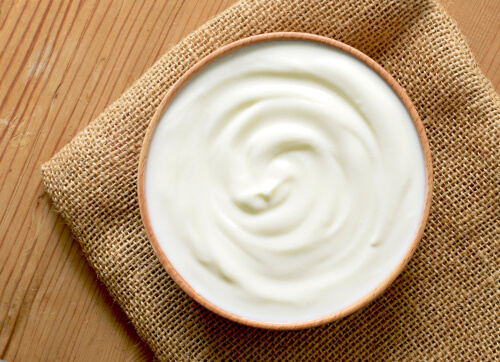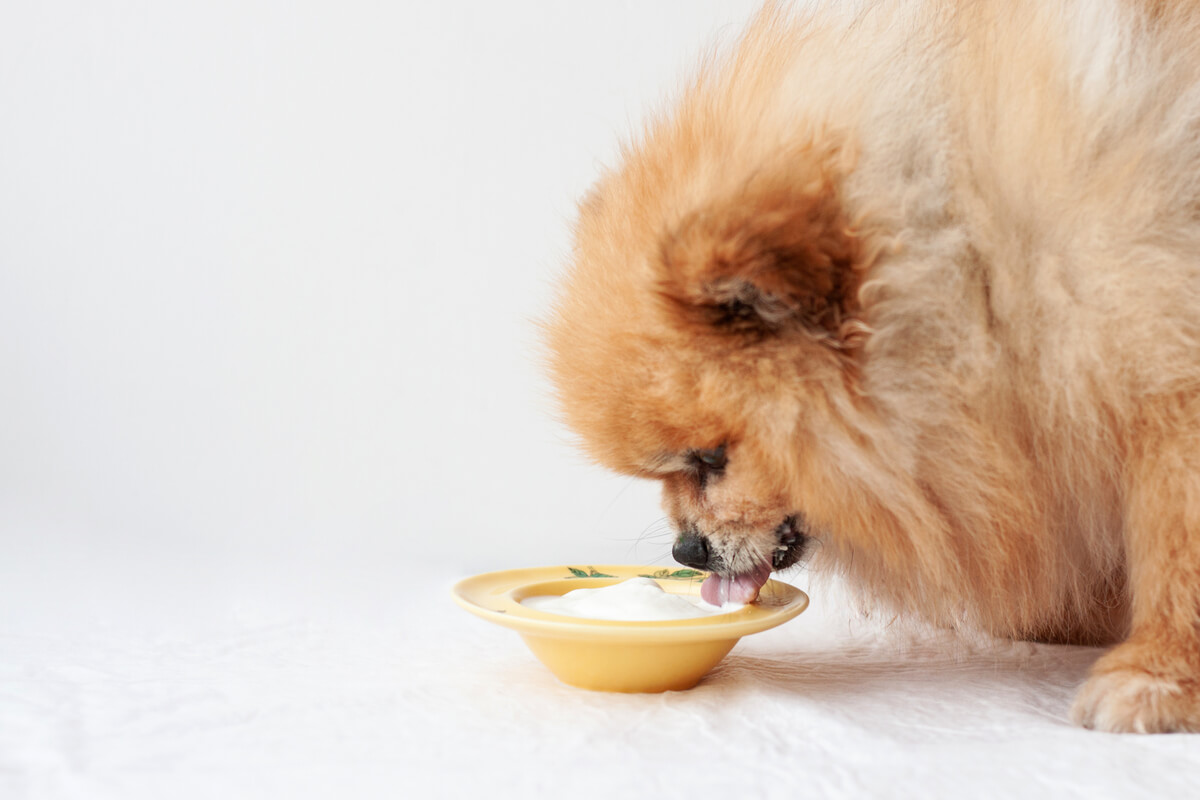Is it Advisable to Give Yogurt to Your Dog?


Written and verified by the biologist Cesar Paul Gonzalez Gonzalez
Yogurt is a milk derivative that has great nutritional benefits for humans, and, so, it’s quite normal to wonder whether it’s a good idea to give yogurt to your dog.
Not all foods that we eat on a daily basis are suitable for your faithful friend. For this reason, it’s always a good idea to investigate whether or not you can give them certain types of food that we commonly eat.
It’s very likely that your dog won’t refuse to eat a portion of yogurt, as it’s a new experience for its palate. However, you need to keep in mind that their digestive system isn’t the same as ours, and it’s dangerous to give them food without thinking about the consequences. Keep reading this article, and find out if it’s good to give yogurt to your dog.
What is yogurt?
Yogurt is a product obtained by fermenting milk. This process is caused by the bacteria Lactobacillus bulgaricus and Streptococcus thermophilus, whose role is to transform dairy sugar (lactose) into lactic acid. This causes it to acquire a creamier appearance and the sour-acid taste that is characteristic of this food.

Technically, a fermented milk product can only earn the name yogurt if it contains at least 10 million bacterial colonies per gram. Although it may seem strange, these microorganisms don’t represent a health risk, as they’re part of the intestinal biota of various animals and help in the absorption of nutrients.
Can my dog eat yogurt?
Dogs can eat yogurt, but only under certain conditions. This food contains a small amount of lactose, which is a component that’s present in all dairy products and their derivatives. The problem is that most adult dogs are lactose intolerant. Because of this, their bodies don’t digest the food well and it can wreak havoc on their intestines.
Lactase is an enzyme that’s responsible for degrading lactose and taking advantage of its nutritional contribution. As contradictory as it may seem, this molecule is present in puppies, although they begin to lose it as they grow and mature. This causes them to become lactose intolerant at a certain age.

Although yogurt has several health benefits for dogs, not all of them are suitable for consumption. Because of this, it’s recommended to review the following points to determine if your pet can eat this food:
- The age of the dog. As mentioned, younger dogs are a little more tolerant of lactose, so it’s better to offer them yogurt when they’re still young.
- The presence of allergies. Although it isn’t very common, there’s a possibility that your dog may be allergic to yogurt. This doesn’t only mean digestion problems, but also inflammation, scaling, or itching. There aren’t any tests to find out what kind of food they’re intolerant to, but if they have any allergies, then they’re more likely to be susceptible to others.
Benefits
If your dog is able to consume yogurt, then it can have several benefits for their health. This food doesn’t only contain microorganisms that aid digestion, but also provides easily absorbed fats, calcium, proteins, vitamins, and minerals. Thanks to this, it can be an ideal supplement for your dog.
Not all commercial yogurts are suitable
Most commercial yogurts include a large amount of natural or artificial sugar, which is quite harmful for dogs. Therefore, if you want to offer this type of food to your dog, try to look for a natural type that doesn’t contain flavorings or fruit pieces.
How much yogurt could I give my dog?
There’s no exact measure of yogurt that should be given to dogs, as it’s an uncommon food in their diet. However, it’s best not to exceed three servings per week. Remember that this product still contains sugar and a certain amount of fat. So, don’t exceed its use or you could cause nutritional problems for your pet.
Precautions to take into account
As mentioned above, lactose intolerance is something that should be treated with extreme caution. Otherwise, flatulence, diarrhea, and vomiting may occur in the dog. Although initially these aren’t very noticeable, if yogurt consumption is prolonged, serious health complications can appear.

It’s also important that this food doesn’t become an essential part of their diet, as excess fat or sugar could lead to diabetes or even pancreatitis. Therefore, it’s best to use yogurt as a sort of treat and not as regular food.
Any reactions or strange behavior that appear after yogurt intake should be checked by a veterinarian. Most likely it won’t pose a health risk to the dog, but it’s best to make sure. Whenever you introduce a new element into your pet’s diet, keep a close eye on their behavior and don’t hesitate to consult a professional if necessary.
Yogurt is a milk derivative that has great nutritional benefits for humans, and, so, it’s quite normal to wonder whether it’s a good idea to give yogurt to your dog.
Not all foods that we eat on a daily basis are suitable for your faithful friend. For this reason, it’s always a good idea to investigate whether or not you can give them certain types of food that we commonly eat.
It’s very likely that your dog won’t refuse to eat a portion of yogurt, as it’s a new experience for its palate. However, you need to keep in mind that their digestive system isn’t the same as ours, and it’s dangerous to give them food without thinking about the consequences. Keep reading this article, and find out if it’s good to give yogurt to your dog.
What is yogurt?
Yogurt is a product obtained by fermenting milk. This process is caused by the bacteria Lactobacillus bulgaricus and Streptococcus thermophilus, whose role is to transform dairy sugar (lactose) into lactic acid. This causes it to acquire a creamier appearance and the sour-acid taste that is characteristic of this food.

Technically, a fermented milk product can only earn the name yogurt if it contains at least 10 million bacterial colonies per gram. Although it may seem strange, these microorganisms don’t represent a health risk, as they’re part of the intestinal biota of various animals and help in the absorption of nutrients.
Can my dog eat yogurt?
Dogs can eat yogurt, but only under certain conditions. This food contains a small amount of lactose, which is a component that’s present in all dairy products and their derivatives. The problem is that most adult dogs are lactose intolerant. Because of this, their bodies don’t digest the food well and it can wreak havoc on their intestines.
Lactase is an enzyme that’s responsible for degrading lactose and taking advantage of its nutritional contribution. As contradictory as it may seem, this molecule is present in puppies, although they begin to lose it as they grow and mature. This causes them to become lactose intolerant at a certain age.

Although yogurt has several health benefits for dogs, not all of them are suitable for consumption. Because of this, it’s recommended to review the following points to determine if your pet can eat this food:
- The age of the dog. As mentioned, younger dogs are a little more tolerant of lactose, so it’s better to offer them yogurt when they’re still young.
- The presence of allergies. Although it isn’t very common, there’s a possibility that your dog may be allergic to yogurt. This doesn’t only mean digestion problems, but also inflammation, scaling, or itching. There aren’t any tests to find out what kind of food they’re intolerant to, but if they have any allergies, then they’re more likely to be susceptible to others.
Benefits
If your dog is able to consume yogurt, then it can have several benefits for their health. This food doesn’t only contain microorganisms that aid digestion, but also provides easily absorbed fats, calcium, proteins, vitamins, and minerals. Thanks to this, it can be an ideal supplement for your dog.
Not all commercial yogurts are suitable
Most commercial yogurts include a large amount of natural or artificial sugar, which is quite harmful for dogs. Therefore, if you want to offer this type of food to your dog, try to look for a natural type that doesn’t contain flavorings or fruit pieces.
How much yogurt could I give my dog?
There’s no exact measure of yogurt that should be given to dogs, as it’s an uncommon food in their diet. However, it’s best not to exceed three servings per week. Remember that this product still contains sugar and a certain amount of fat. So, don’t exceed its use or you could cause nutritional problems for your pet.
Precautions to take into account
As mentioned above, lactose intolerance is something that should be treated with extreme caution. Otherwise, flatulence, diarrhea, and vomiting may occur in the dog. Although initially these aren’t very noticeable, if yogurt consumption is prolonged, serious health complications can appear.

It’s also important that this food doesn’t become an essential part of their diet, as excess fat or sugar could lead to diabetes or even pancreatitis. Therefore, it’s best to use yogurt as a sort of treat and not as regular food.
Any reactions or strange behavior that appear after yogurt intake should be checked by a veterinarian. Most likely it won’t pose a health risk to the dog, but it’s best to make sure. Whenever you introduce a new element into your pet’s diet, keep a close eye on their behavior and don’t hesitate to consult a professional if necessary.
All cited sources were thoroughly reviewed by our team to ensure their quality, reliability, currency, and validity. The bibliography of this article was considered reliable and of academic or scientific accuracy.
- Jovanović, M., Zlatanović, S., Micić, D., Bacić, D., Mitić-Ćulafić, D., Đuriš, M., & Gorjanović, S. (2021). Functionality and Palatability of Yogurt Produced Using Beetroot Pomace Flour Granulated with Lactic Acid Bacteria. Foods, 10(8), 1696.
- Babio, N., Mena-Sánchez, G., & Salas-Salvadó, J. (2017). Más allá del valor nutricional del yogur:¿ un indicador de la calidad de la dieta?. Nutrición Hospitalaria, 34, 26-30.
- Ripley, K. (2015). Can Dogs Eat Yogurt?. Recuperado el 21 de febrero de 2022, disponible en: https://www.akc.org/expert-advice/nutrition/can-dogs-eat-yogurt/
- Hennet, P. (2006). Nutrición y salud oral en el perro. Enciclopedia de la Nutrición Clínica Canina; Pibot, P., Biourge, V., Elliot, DA, Eds, 413-418.
This text is provided for informational purposes only and does not replace consultation with a professional. If in doubt, consult your specialist.








